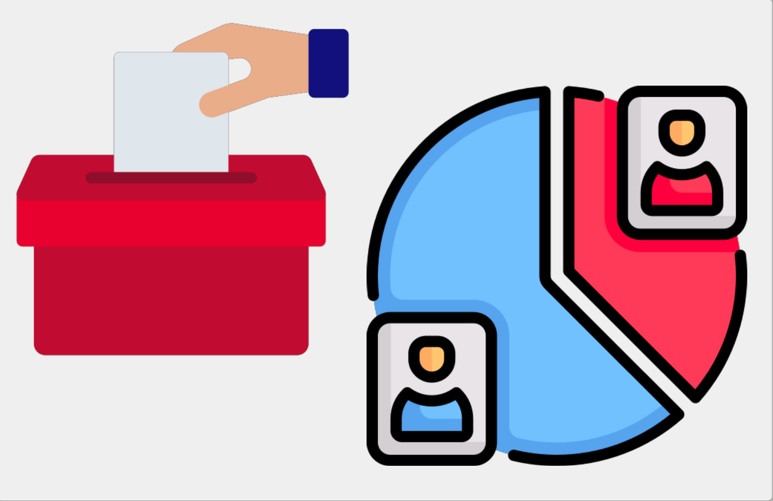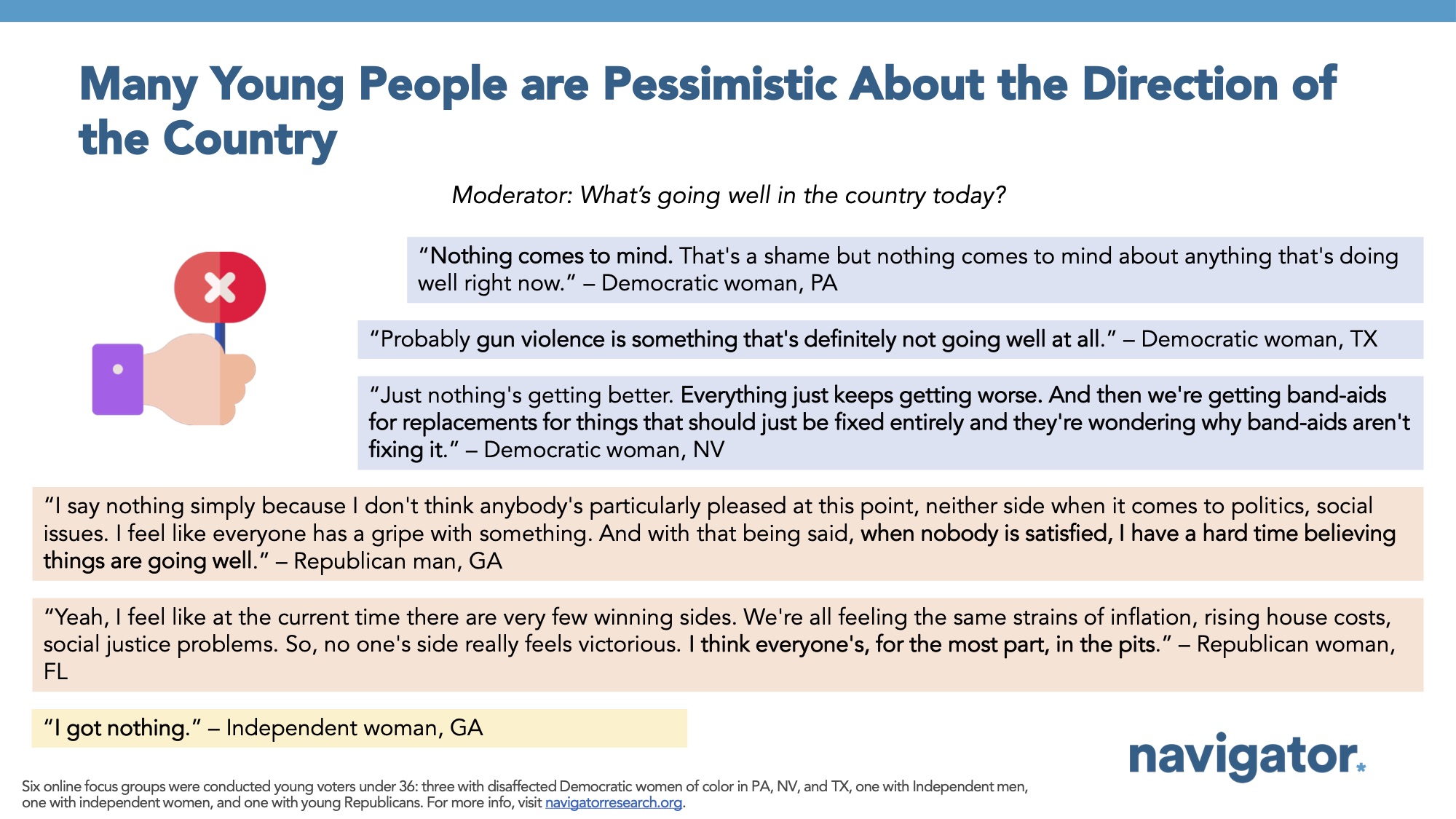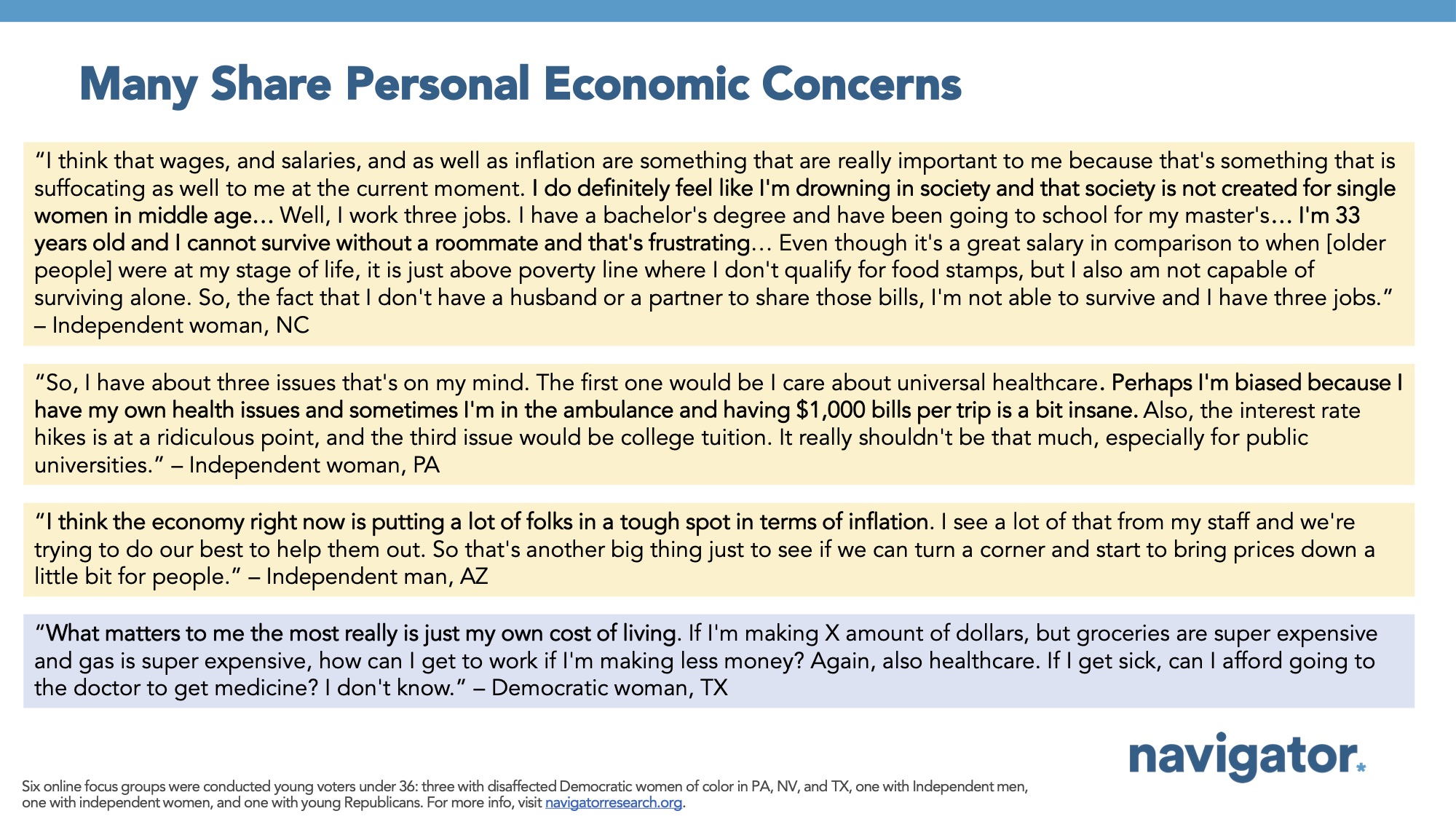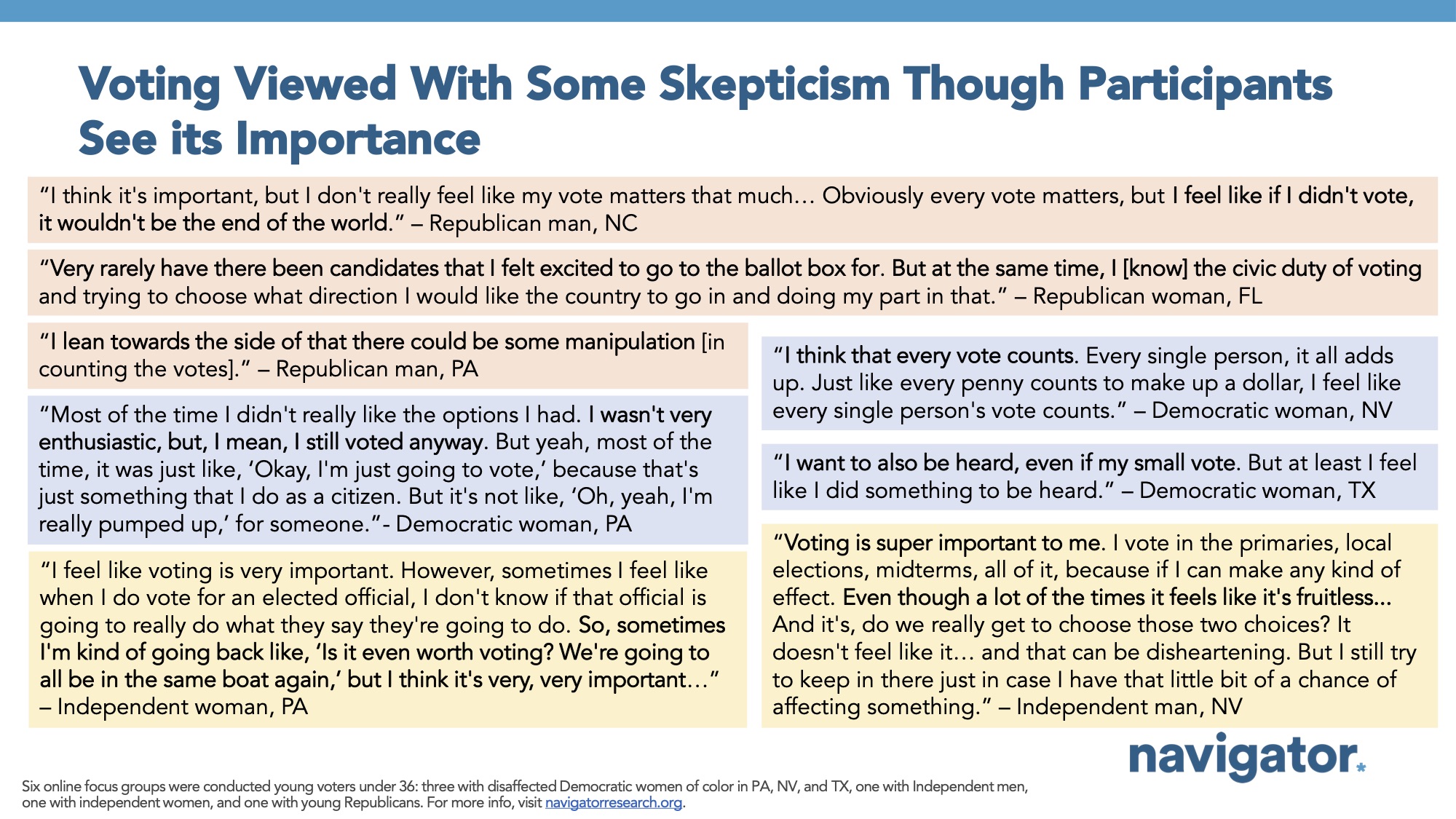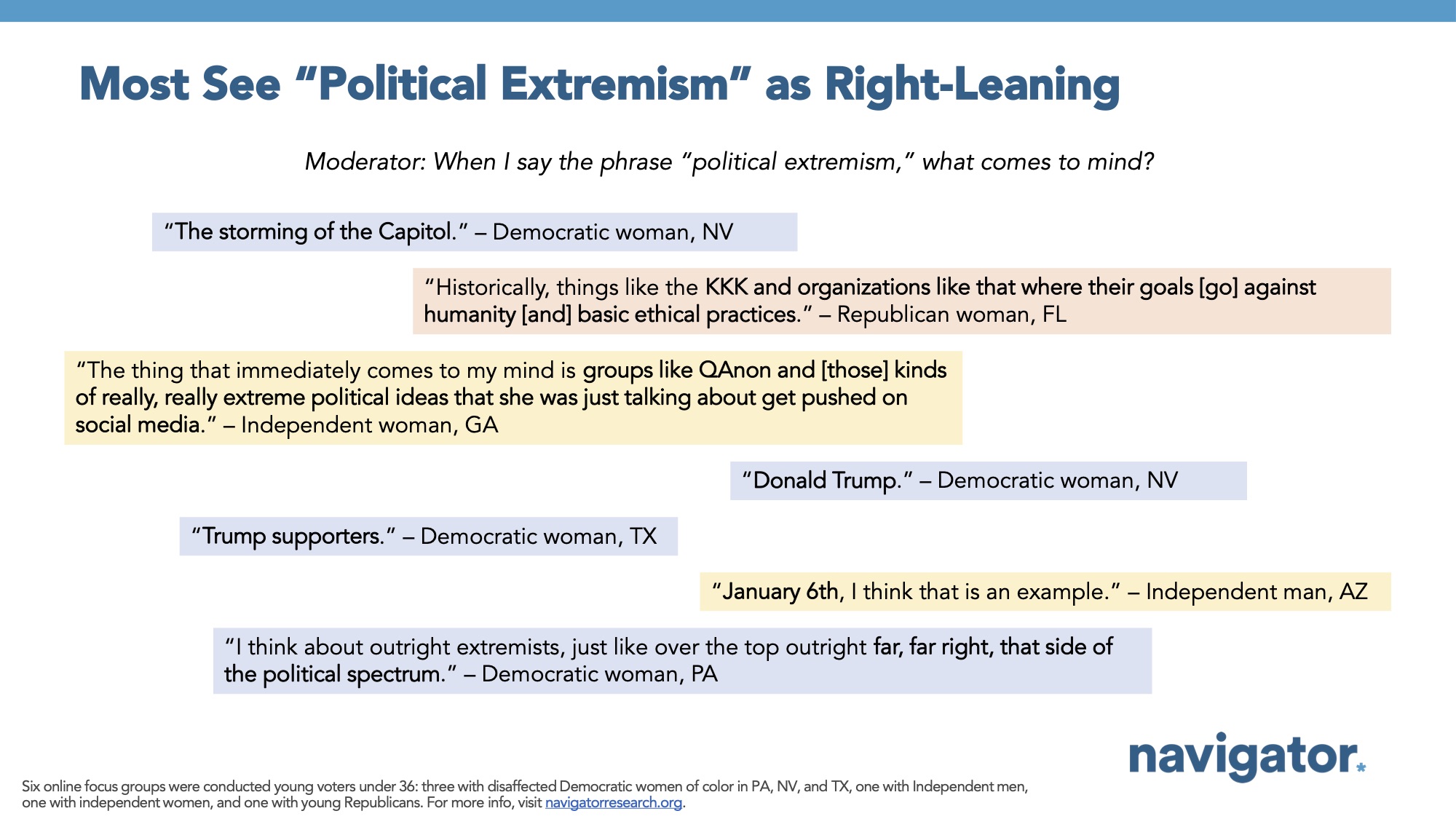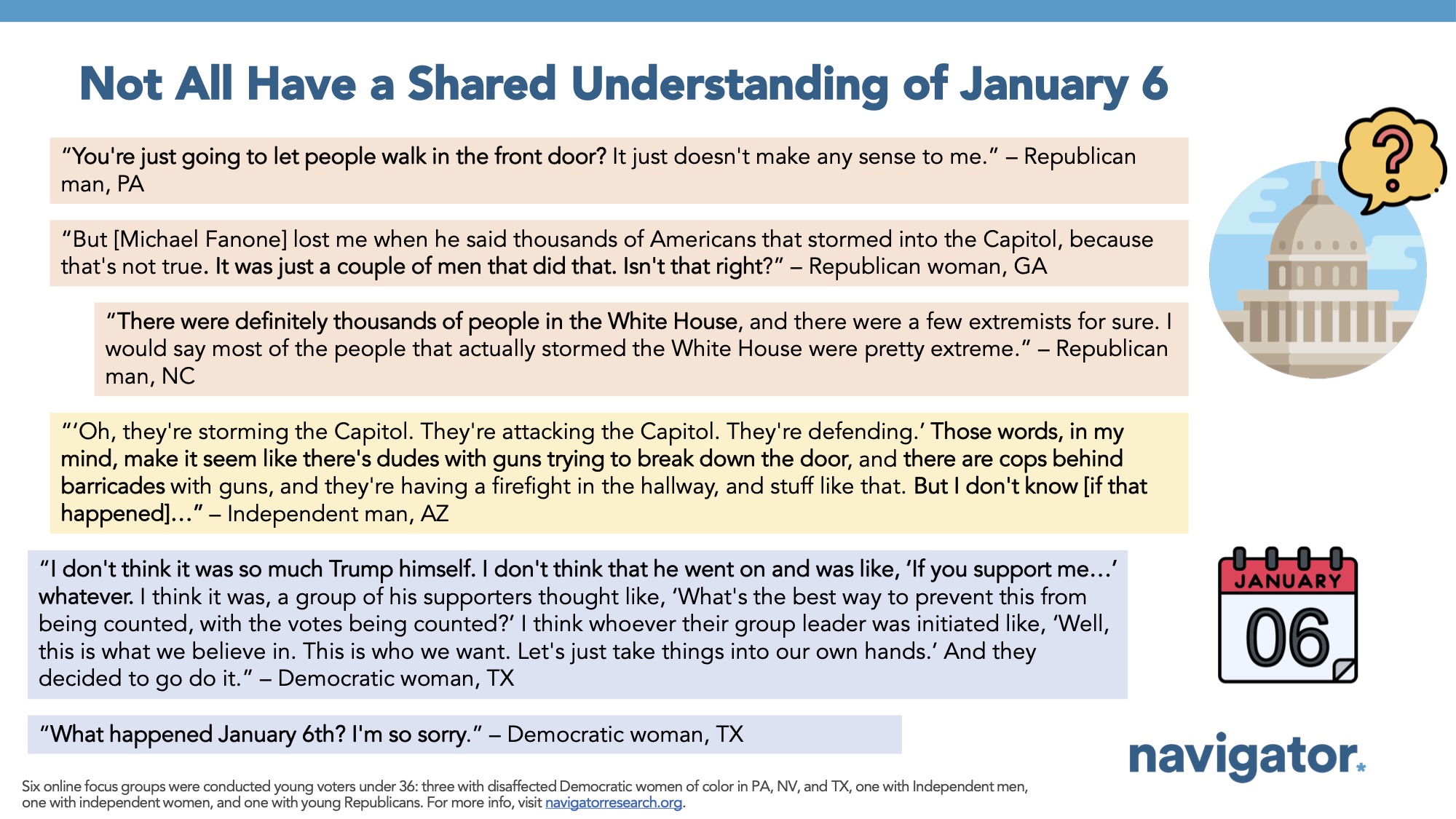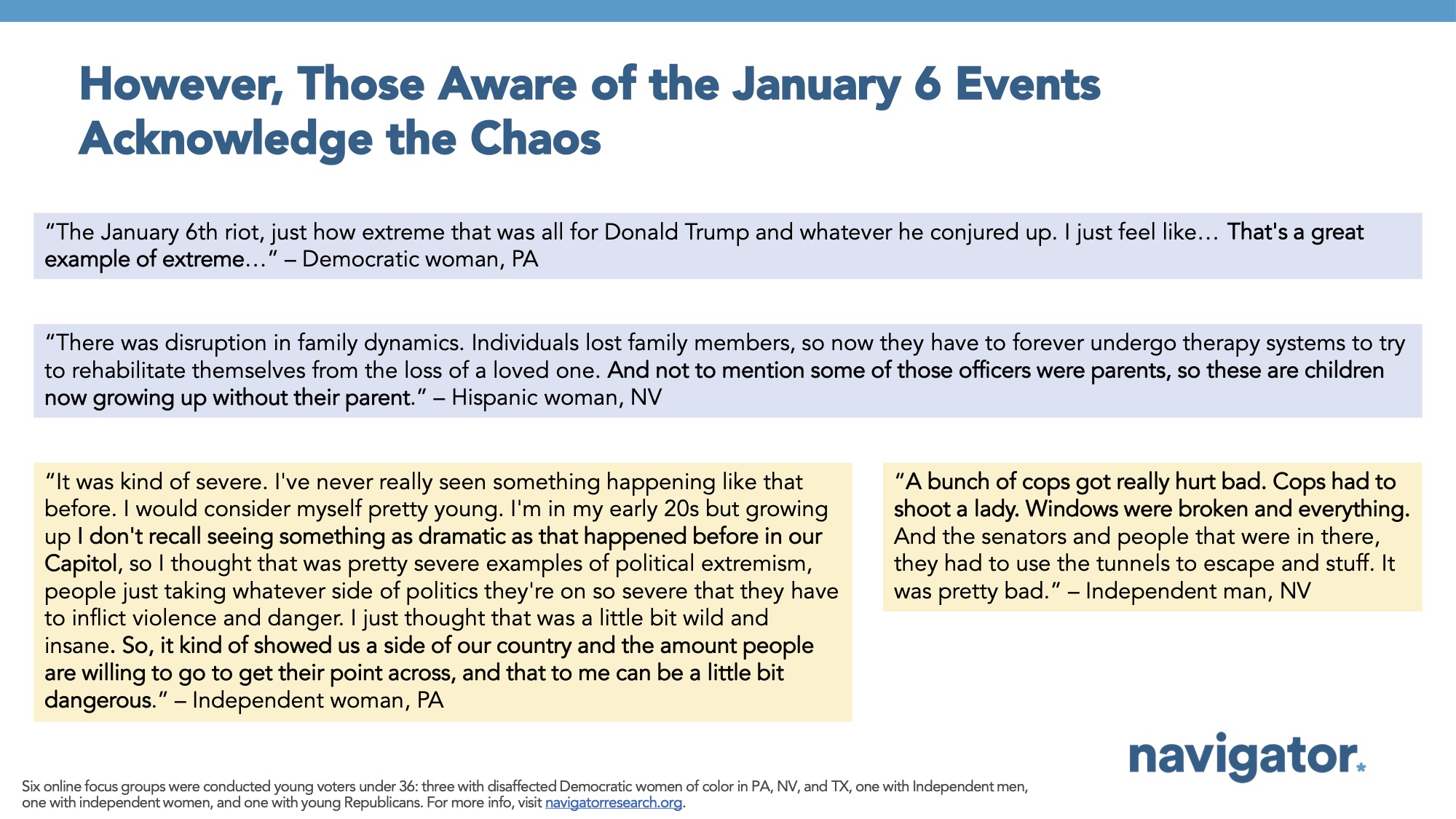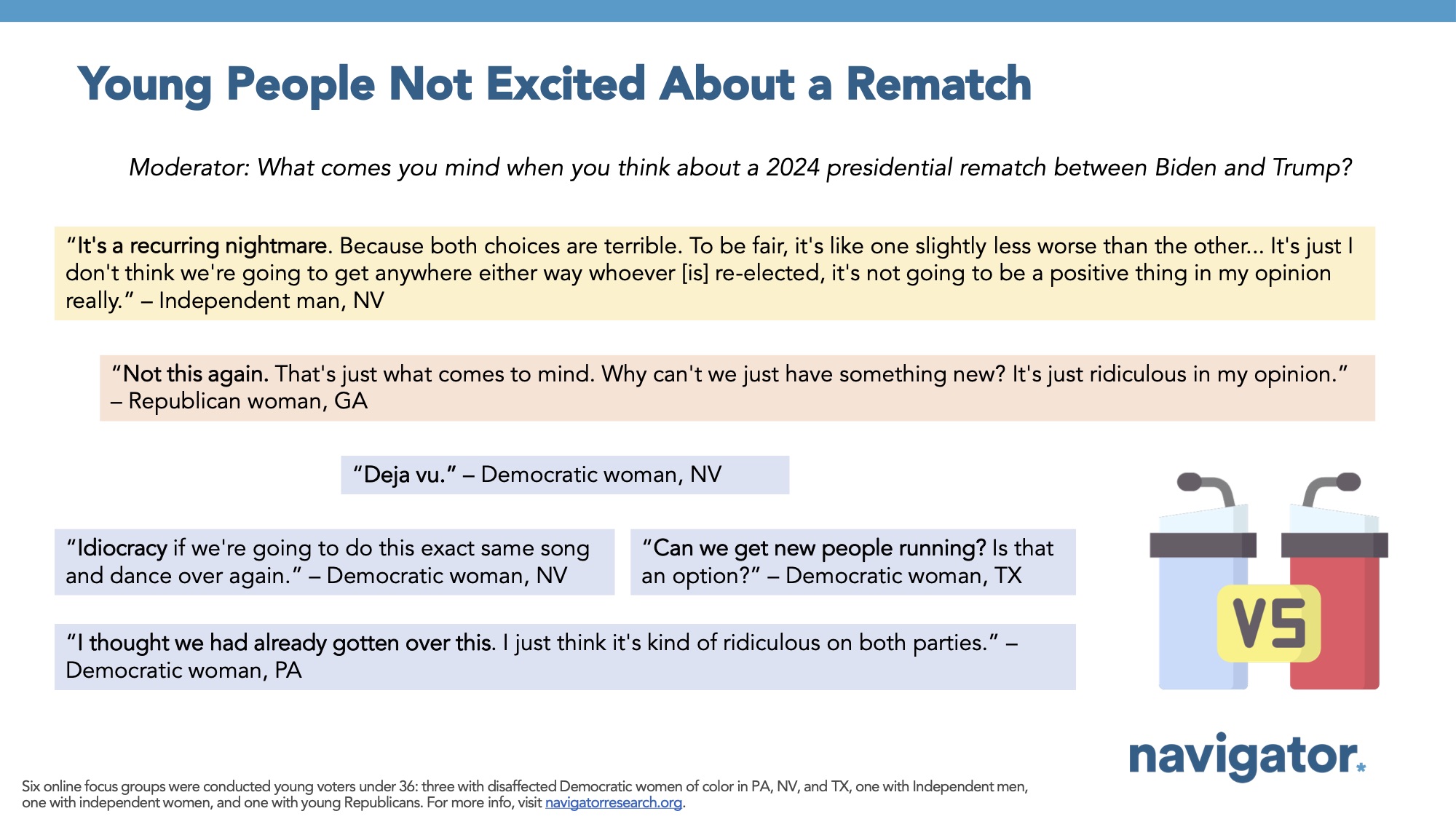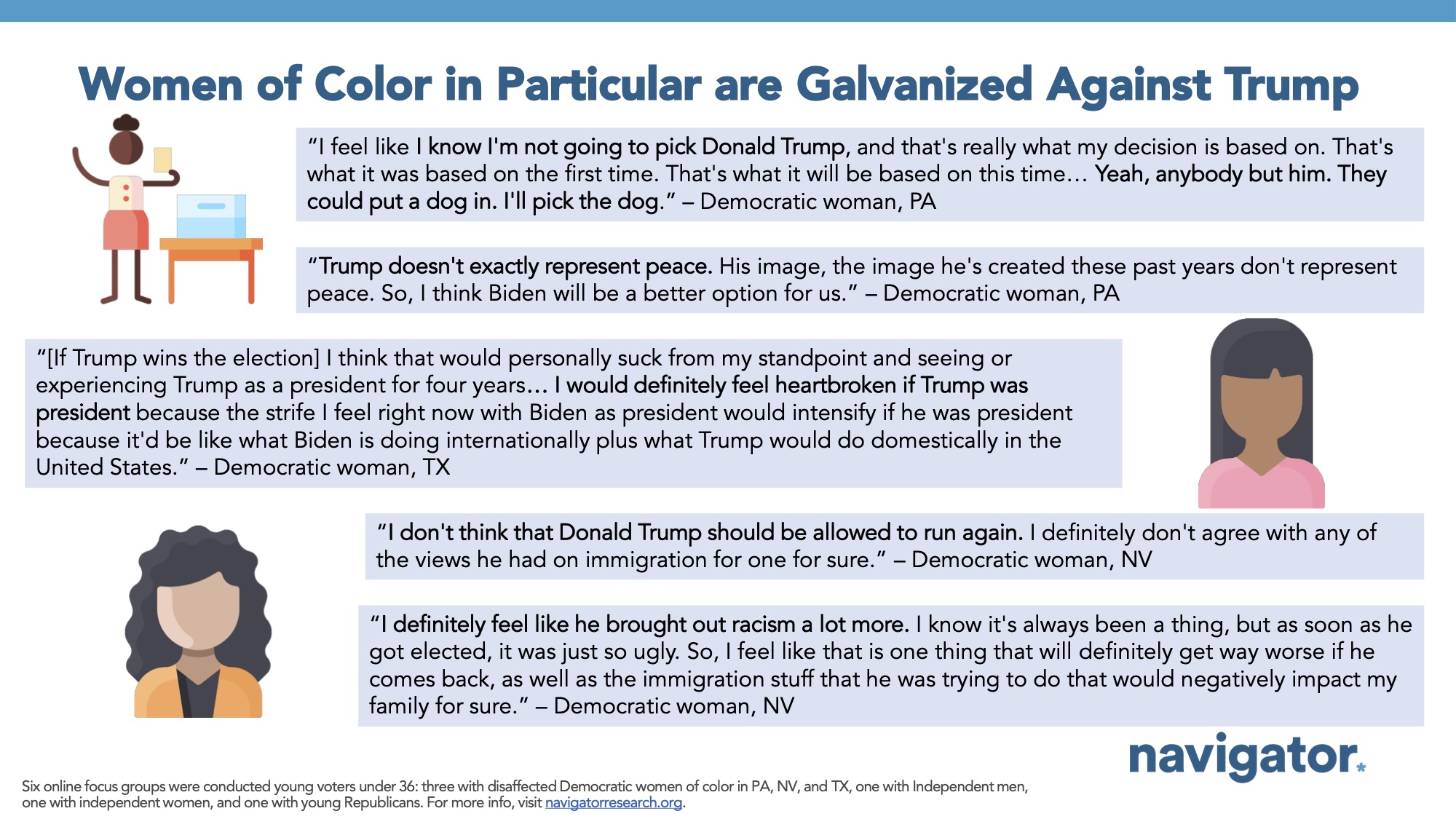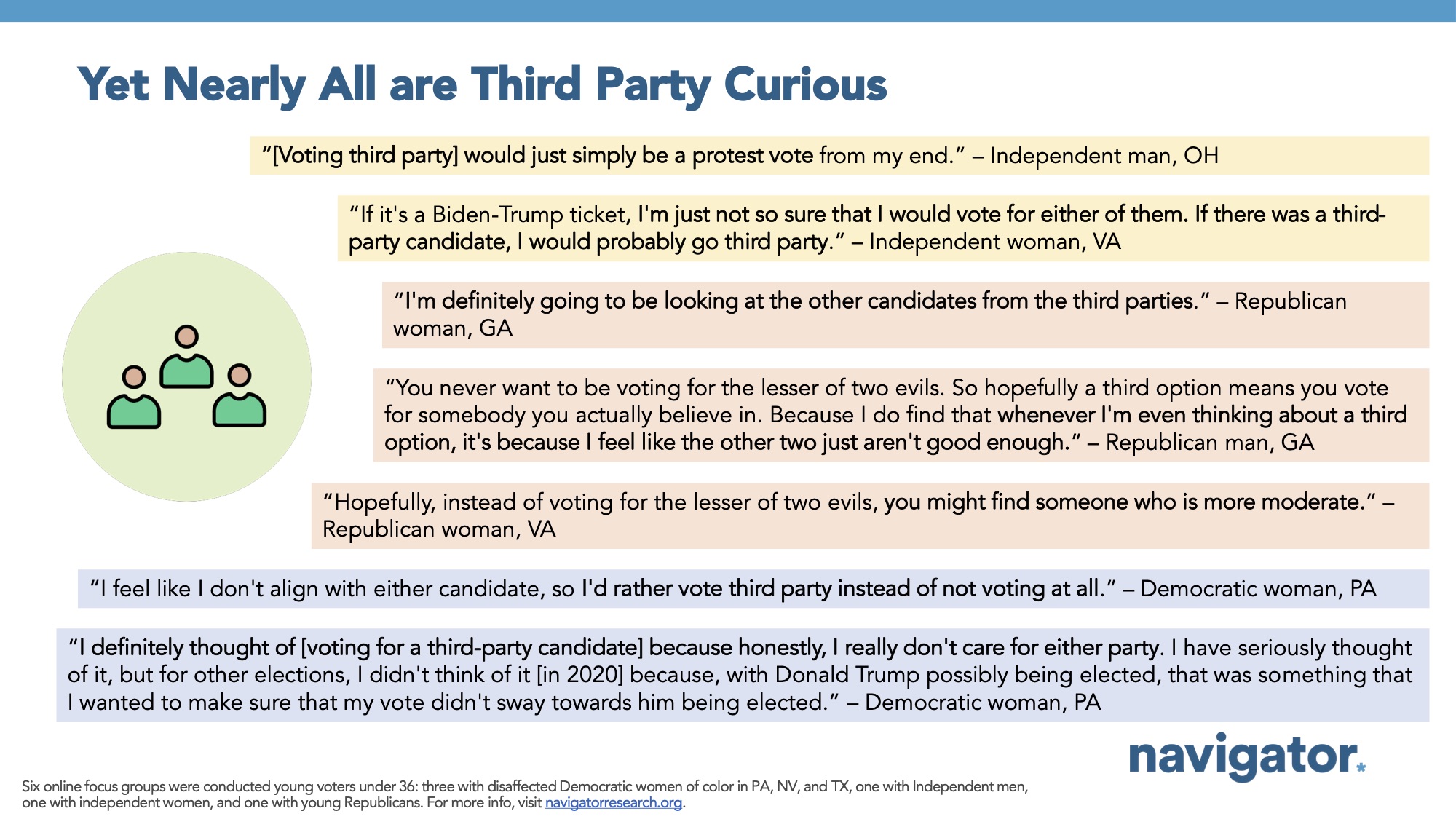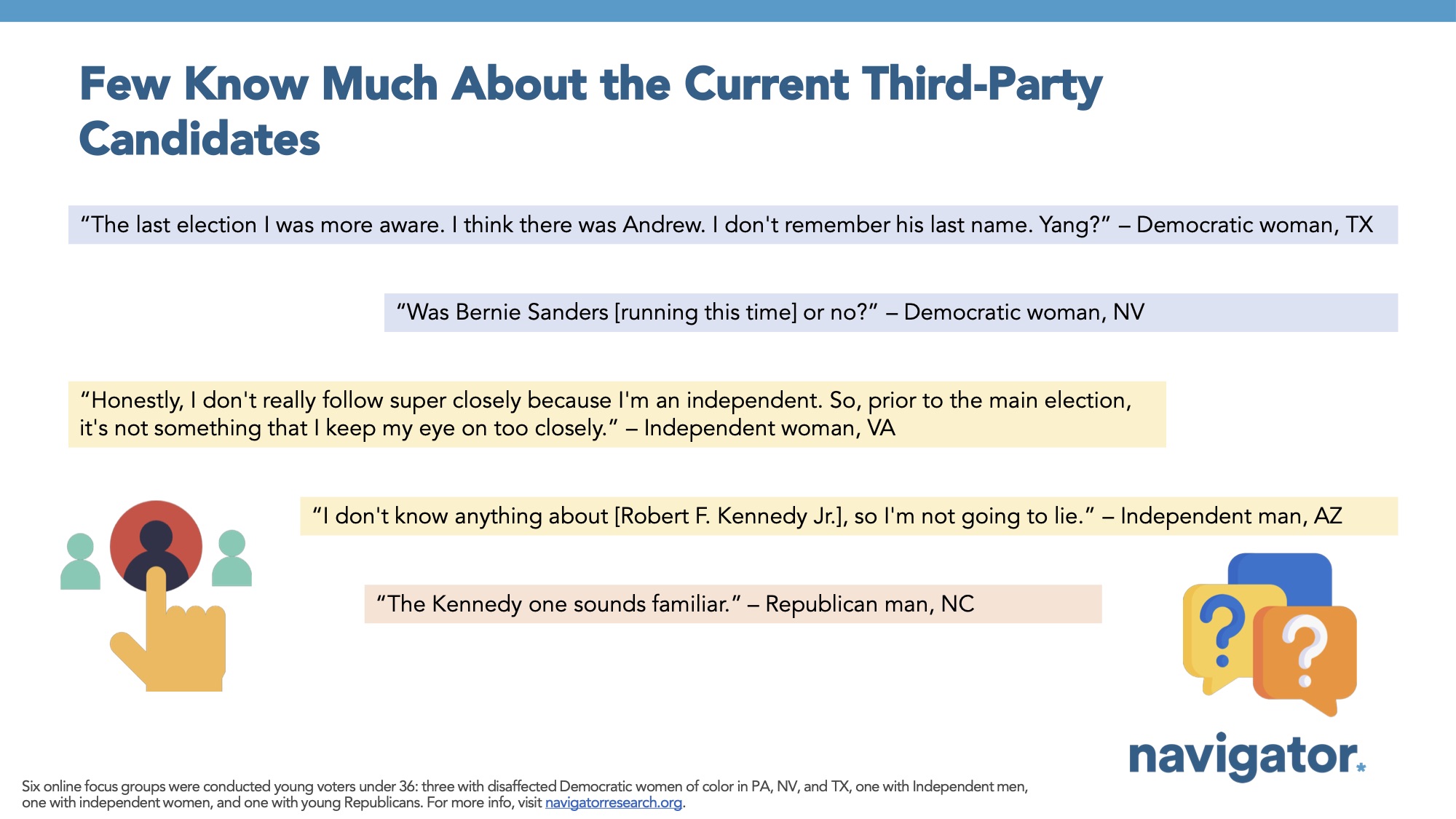Focus Group: Young Americans on the 2024 Election
This Navigator Research report contains insights from focus groups* conducted among younger Americans under the age of 36. The groups were conducted among young Democratic women of color in Nevada, Pennsylvania, and Texas, as well as young independent men, independent women, and young Republicans from across the country who are undecided on their vote preference in the 2024 presidential election.
Younger Americans are particularly negative on the state of the country today.
In our latest survey, three in four Americans said the country today is off on the wrong track (73 percent), including 76 percent of Americans under the age of 35. During focus groups with young Democrats, independents, and Republicans, similar negative sentiments were shared. Few participants could come up with a positive thing to say about the state of the country today. As a young Democrat in Nevada put it: “Just nothing’s getting better. Everything just keeps getting worse. And then we’re getting band-aids for replacements for things that should just be fixed entirely and they’re wondering why band-aids aren’t fixing it.” A young Republican in Georgia similarly noted: “I say nothing simply because I don’t think anybody’s particularly pleased at this point, neither side when it comes to politics, social issues. I feel like everyone has a gripe with something. And so with that being said, when nobody is satisfied, I have a hard time believing things are going well.”
- Many attributed their negative feelings to the economy. One Democrat in Pennsylvania said: “I would say with inflation and everything, right now I’m making more money than I’ve ever made before and it still feels like it’s not enough money.” In the same late October survey, four in five Americans under the age of 35 rated the economy negatively (79 percent) compared to just 19 percent who rated the economy positively. Participants spoke to their own personal financial stresses, including one independent in Virginia who said: “I can attest to the standard of living. I live with my parents… I understand and I hate telling people I live with my parents, but that’s where I am in life because I can’t afford to live anywhere else, and I have a job that I love. I get paid probably more than the average person, but not enough to be able to really get anything in my area, and I have student loans as well.” A Democrat in Texas similarly said: “What matters to me the most really is just my own cost of living. If I’m making X amount of dollars, but groceries are super expensive and gas is super expensive, how can I get to work if I’m making less money than. Again, also… health care. If I get sick, can I afford going to the doctor to get medicine? I don’t know.”
When it comes to voting, younger Americans view voting as important, though the power of voting is sometimes met with skepticism.
When asked how they felt about voting, participants shared that they rarely are excited but view it as important. As one Republican in Florida put it: “Very rarely have there been candidates that I felt excited to go to the ballot box for. But at the same time, I [know] the civic duty of voting and trying to choose what direction I would like the country to go in, and doing my part in that.” A Democrat in Pennsylvania similarly said: “Most of the time I didn’t really like the options I had. I wasn’t very enthusiastic, but, I mean, I still voted anyway. But yeah, most of the time, it was just like, ‘Okay, I’m just going to vote,’ because that’s just something that I do as a citizen. But it’s not like, ‘Oh, yeah, I’m really pumped up’ for someone.”
When asked about political extremism, several participants brought up “Trump” and “January 6” referencing the insurrection at the Capitol.
There was mixed understanding of what occurred on January 6th, particularly among the independents and Republican participants, though a young Republican in Florida said she felt shameful around the association: “[I feel] shame and embarrassment in a way to be somewhat politically affiliated with some of the people who they claim to have done violent acts.”
- Participants who were more informed of the storming of the Capitol spoke of how bad it was. One independent in Pennsylvania said: “It was kind of severe. I’ve never really seen something happening like that before. I would consider myself pretty young. Growing up, I don’t recall seeing something as dramatic as that happened before in our Capitol, so I thought that [a] was pretty severe example of political extremism.” Another independent in Nevada said: “A bunch of cops got really hurt bad. [The] cops had to shoot a lady. Windows were broken and everything. And the senators and people that were in there, they had to use the tunnels to escape and stuff. It was pretty bad.”
Younger women of color are particularly galvanized against Trump.
While the idea of a 2024 rematch between President Biden and Trump evokes frustration from young Americans, Democratic women of color were particularly galvanized against Trump. Participants were not excited about the idea that Biden and Trump would likely be the candidates for the two major parties again. One Democrat in Pennsylvania said: “I thought we had already gotten over this. I just think it’s kind of ridiculous on both parties.” A Republican in Georgia similarly noted: “Just, not this again. That’s just what comes to mind. Why can’t we just have something new? It’s just ridiculous in my opinion.”
- Among Democratic women of color, many recalled Trump’s first term eliciting racism and chaos. One Democrat in Pennsylvania said: “I think we stand a better chance in terms of security and health care and other issues of violence and hate crimes, all that in our country… because Trump doesn’t exactly represent peace. His image, the image he’s created these past years don’t represent peace… so I think Biden will be a better option for us.” Another Democrat in Nevada said: “I definitely feel like [Trump] brought out racism a lot more. I know it’s always been a thing, but as soon as [Trump] got elected, it was just so ugly. So I feel like that is one thing that will definitely get way worse if he comes back, as well as the immigration stuff that he was trying to do that would negatively impact my family for sure.”
While many young Americans expressed curiosity for third party candidates, many felt that it would be a wasted vote.
Most participants indicated that they would be open to a third party candidate for the 2024 presidential election, given their frustration with the primary options. One Georgia Republican said: “It’s definitely not something I’ve ever thought of doing, but now that I’m hearing that the prospective two candidates are those two, I’m definitely going to be looking at the other candidates from the third parties.” An independent in Virginia also said: “If it’s a Biden-Trump ticket, I’m just not so sure that I would vote for either of them. If there was a third party candidate, I would probably go third party.” Yet many felt a third party vote would be a wasted vote, including a Democrat in Texas who said: “This year, I’m not sure. It just seems to me like a waste of time and a waste of a vote, honestly, because [third party candidates] don’t seem to have enough popularity just yet.” A Republican in Pennsylvania similarly said: “I just don’t think they’re going to win. I’m sorry.” An Arizona independent who expressed particular interest in a viable third party candidate also questioned the value of supporting one: “I would love to vote for a third party… but as it stands now, they get like, what, 2 percent of the vote, 3 percent of the vote? It’s a waste of a vote.”
About The Study
GBAO conducted six online focus groups November 1-2, 2023 with young voters under 36: independent and Republican men and women across the country who are undecided about their vote preference in the 2024 presidential election. Some quotes have been lightly edited for brevity. Qualitative results are not statistically projectable.
